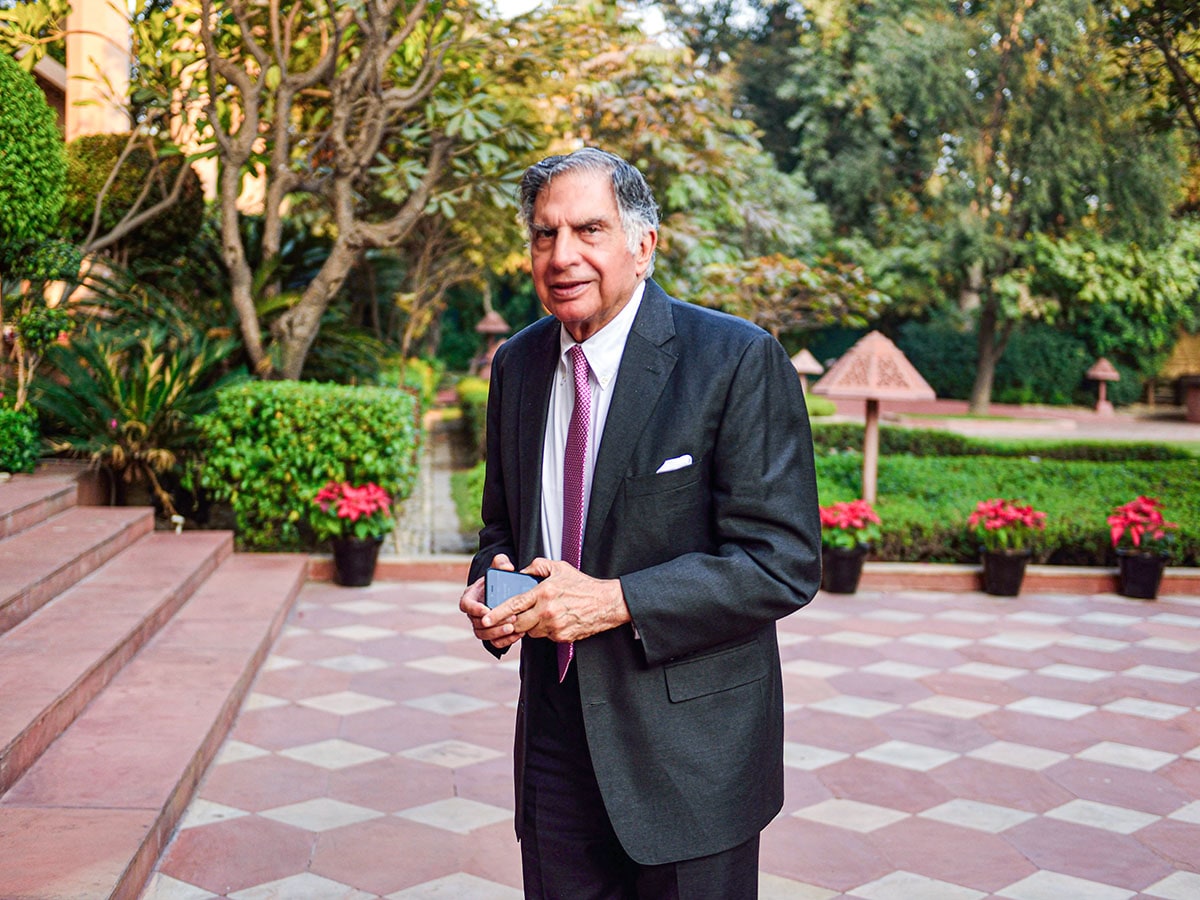 Ratan Tata, chairman of Tata Trust at an event hosted at Taj Mansingh, New Delhi, on January 11, 2016. File image: Pradeep Gaur/Mint via Getty Images
Ratan Tata, chairman of Tata Trust at an event hosted at Taj Mansingh, New Delhi, on January 11, 2016. File image: Pradeep Gaur/Mint via Getty Images
My interactions with Ratan Tata began when I moved to Mumbai to head marketing for the Taj Group of Hotels in 1996 when he was the chairman of the Indian Hotels Company Limited. I got more opportunities to speak to him when I became the chief operating officer in 2003.
I will always remember Ratan Tata to be a person with a global mindset.
For instance, after acquiring Tetley, Jaguar, and Corus, it became much easier for us to make presentations on the Taj Group of Hotels abroad. Before the acquisition, there wasn’t enough visibility, but soon there was an immediate recognition of the Tata brand.
I also remember him for his contribution—Rs220 crore—to build a hall, named the Tata Hall, at the Harvard Business School campus. It is the largest international donation in the school’s history. He did his advanced management program from there in 1975, and I did it in 2010. I was there when he came to inaugurate it. It showed the world that India has a global reach.
He wasn’t narrow in his thinking. I’ll give you another example of his global thinking.
He asked the Taj Group to do a Harvard classroom at the Taj Land’s End in Bandra, Mumbai. It was an expensive proposition, it meant giving up real estate, but he understood what it would do for the Taj brand if it had a connection to Harvard and it was that that made us do the classroom. It is an amphitheater-style classroom, started in 2012, which replicated the classrooms on the school’s Boston campus, to offer students a similar learning experience, a first in India.
Therefore, for me, he will be the one who took Tata to the world. He did not limit it to India.
I will also remember him for his passion for architecture and details. When we bought the Sea Rock Hotel, situated opposite Bandra’s Taj Land’s End, we did a global conference with the best architects in the world, because he wanted to leave an architectural landmark for Mumbai. I could see at the meetings I attended, his attention to detail and the questions he asked. And this passion remained right till the end.
I recall another instance of how attentive he was. I was running the business hotels at that time and had just finished a major renovation project at the Taj Residency in Bengaluru. He came back to me saying he was pleased to see Herman Miller chairs in the guest’s rooms. He had a keen eye for details.In photos: Ratan Tata: A titan moves on
I also remember him to be a shy person. He would come for events hosted by the Tata group, or by others. Very often, he’d end up leaving from the back area to avoid being hounded. Another thing I remember about him is his reluctance to be seen in the public eye. I remember after the 26/11 attacks, Hillary Clinton came and stayed at the Taj in Mumbai. She was holding a press conference and asked me to invite him. He had no intention or desire to come down, but because I told him that it was important for me and the hotel business, he agreed. So he was quite willing to step out if you reached out to him.
From a personal experience, he was more comfortable with a one-on-one. In a social setting, he would not necessarily reach out because he was shy, but if you went and sat next to him, he was happy to discuss many things about life, not just work. He was open to chatting with people. I asked him if he knew my name, and he did. He was observant. He was approachable if you went to speak to him.
From what I saw, I would say that his leadership style was not to intervene if things were going well. He was forward-thinking. He never let us think that he’s the boss. He wanted all teams to work together as part of one group, to give them a feeling of cohesion and togetherness. Before him, each Tata company operated on its own. Under his leadership, one of the biggest benefits was that the group worked together and also leaned on each other when required.
He was always soft in his approach towards employees. In situations that were both tough and good, he was always calm. He was never harsh in handling things. He showed a sense of courtesy and politeness to all levels of people in the group and outside it. He had a soft and persuasive style to push his employees and wasn’t aggressive.
During 26/11, we received unstinted support from him. He was the first to walk into the hotel with us after the police had cleared the premises. The physical presence of somebody that senior in the group, to give the assurance that everything was back to normal, really helped us get back up. Then, he encouraged us to set up the Taj Public Service Welfare Trust to aid victims, he personally visited families and provided them with financial support. Nobody was laid off despite shutting down a particular wing for a whole year. I became the chief operating officer after the attack, so I saw the empathy he had towards people first-hand. He was the chairman of the company and could have said it was a financial issue, but there was no money being discussed. Every employee of the closed wing was paid full salaries for that whole year.
As told to Anubhuti Matta
Jyoti Narang was the chief operating officer of Taj Hotels.
